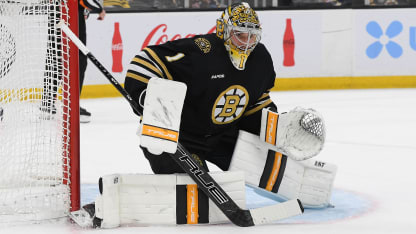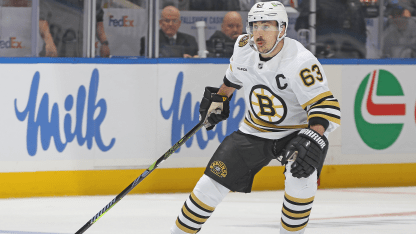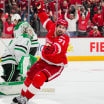So, with the time ticking and the years winding and a team with a revamped defense, a good enough offense and Jeremy Swayman, a world-class goalie, why can’t it be the Bruins?
After all, there’s only so much time left.
“Every year everybody asks me, ‘What year is this for you?’ and I’m like, holy [expletive], I’m a couple shy of a decade here,” said McAvoy, who revealed last week that he and wife, Kiley, are expecting their first child. “I’ve been in the playoffs every single [year]. We’ve had teams that have been extremely competitive, you come really close, one year (2019) we go to the Final, but haven’t been out of the second round since.
“Every year, you’re always sort of like, ‘Hey, we’re building something.’ And I think that that’s true. Every year you get to go to the playoffs, you’ve earned it and you gain experience certainly and [there’s] the cliché of you have to learn how to lose to win.
“This summer I was like, ‘I’m done with this whole next-year [thing]’ because you’re going to blink and it’s going to be over. I’ve already blinked and it’s been eight years. I’ve lost more than enough. So I think this group here, this sort of new core, this is our turn, this is our time to do it. And we’ve got to do it. Because we’ve got a window here where a lot of guys are under contract. And it’s time. It’s time to win.”
* * * *
Anyone else might say that McAvoy is coming to this realization early. He turns 27 in December, meaning some of his best and most productive years should be ahead of him. He is locked up for six more seasons as part of the eight-year, $76 million contract ($9.5 average annual value) he signed on Oct. 15, 2021.
But he has also seen teammates come and go, including defenseman Matt Grzelcyk, who signed with the Pittsburgh Penguins this past offseason. It’s something he’s become more keenly aware of, the churn of players and personnel, the exits and arrivals.
His hockey life is no longer about trying to establish himself, about trying to solidify his position on the team, about trying to earn long-term stability.
His thinking has started to reflect that.
“He’s still extremely young and has a very long career left,” Boston captain Brad Marchand said. “Some guys don’t realize it until the end and the quicker you learn it, the more you can change what you need to on and off the ice. Not just for yourself, but your teammates and the organization to help build toward that goal.”
It was something Marchand saw in the veterans that predated him, something that helped them get to the top of the mountain back in 2011, when the forward was in his first full season in the NHL.
That, now, is 14 seasons ago. A lifetime. A career.
But though Marchand never went through the waiting and working that McAvoy has, having his name on the Cup when he’d just become a full-fledged NHL player, he has always known that time is precious.
“I think that’s what the guys before us all did such a great job at was establishing that right away, like, ‘We’re not going to waste a year or two or five to understand that,’” Marchand said. “‘We need to start building toward something and we’re going to do it right now and every day.’ And it carries a lot of weight and really builds a winning culture.”
That culture, that expectation, was evident in the Bruins’ season-opening press conference. Though most of the attention was drawn to the Swayman contract negotiations -- which was resolved Sunday with an 8-year contract -- what was less remarked on was how management talked about its ultimate goals.
This is a team built not to just make the playoffs. Not to be satisfied with the second round.
This is a team that is ready, a team that believes it has a two-, three-, four-year window, as Marchand guessed. It’s why the Bruins spent a combined $84.25 million on contracts to center Elias Lindholm (seven years, $54.25 million; average annual value of $7.75 million) and defenseman Nikita Zadorov (six years, $30 million; AAV of $5 million) on July 1.
“I’m excited about this year. I really am,” Bruins president Cam Neely said. “I think (general manager) Don [Sweeney] and his staff did a fantastic job this offseason in identifying needs that we felt we were lacking to go for a deep run in the playoffs.”
He added, “If we get everybody in camp and everybody healthy, we’re a Cup contender. There’s no question. I strongly believe that. I think our players believe that. I know our coaching staff believes that. I think we’re going to defend extremely well. Are we going to get the offense we’d like? That remains to be seen.”
* * * *
It’s not as if McAvoy doesn’t know what it takes.
It was all there for them, for him, back on June 12, 2019, when the Bruins and St. Louis Blues took the ice at TD Garden in Boston for Game 7 of the Stanley Cup Final. McAvoy would play 26:02 that night, a night that ended with dreams crushed and eyes red when the Bruins lost 4-1.
They have not been past the second round since.
There are a group of players in Boston who were there in 2019, who have been on the team for a while, made up of McAvoy and David Pastrnak and Charlie Coyle and Trent Frederic and Brandon Carlo, all of whom have become leaders on a team still helmed by its single Cup winner.
“You’re definitely starting to see the maturity in all of them, the way that they prepare and interact and lead on and off the ice,” Marchand said. “And it is tough because there’s a lot of guys that go through all of that and don’t win Cups. But you’re definitely seeing that maturity and understanding of what they need to do.”
It was possible that when the last generation left -- Chara and Bergeron and Krejci, among them -- that the culture could have faded, that the pressing need to win could have dissipated. Instead, it remains.
“We’ve gotten so close and it’s hard when you haven’t gotten over that hump,” Carlo said, citing the need to build a new legacy. “For us, really, that next step is just getting over that hump.”
McAvoy has played in eight NHL postseasons, but in that time the Bruins have been eliminated in the first round three times, the second round four times and the Final once.
They saw the Blues hoist the Cup on their home ice in 2019 and have seen two other Atlantic Division opponents -- the Tampa Bay Lighting (twice) and Panthers -- win the Stanley Cup along with the Pittsburgh Penguins, Colorado Avalanche, Washington Capitals and Vegas Golden Knights.
“You can’t avoid it,” McAvoy said. “As much as you wish you lived under a rock, you always see it and there’s nothing else going through your head, at least mine, besides pure jealousy.”
It’s jealousy and drive and, as he admitted, a little bit of sadness, too.
Another year gone. There are only so many.
“Every single year it’s been the same,” McAvoy said. “We build a great team, we’re always in the conversation for Presidents’ Trophy, we’re putting ourselves in great playoff position year after year after year and the playoffs roll around and -- I know all of us, like I put my heart and soul into it. I’ve got nothing left.
“It’s all we dream about, it’s all we think about, is winning the Stanley Cup. It’s not like we can sit back and be like, ‘I wish I would have done this or done more.’ Everybody does everything they can. It’s just a little bit of, it’s time for the stars to align type [of] thing.”
There is, of course, luck involved. There are bounces and injuries and a save just at the right moment.
“Sometimes it’s not meant to be,” McAvoy said. “Sometimes it is. Just waiting for our time.”






















